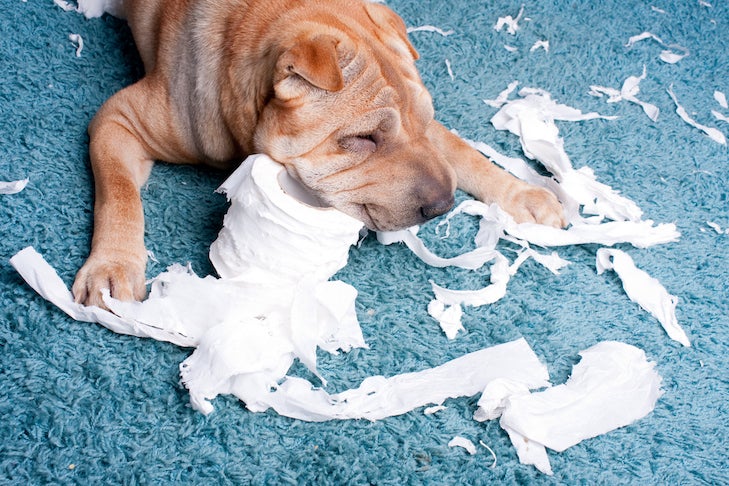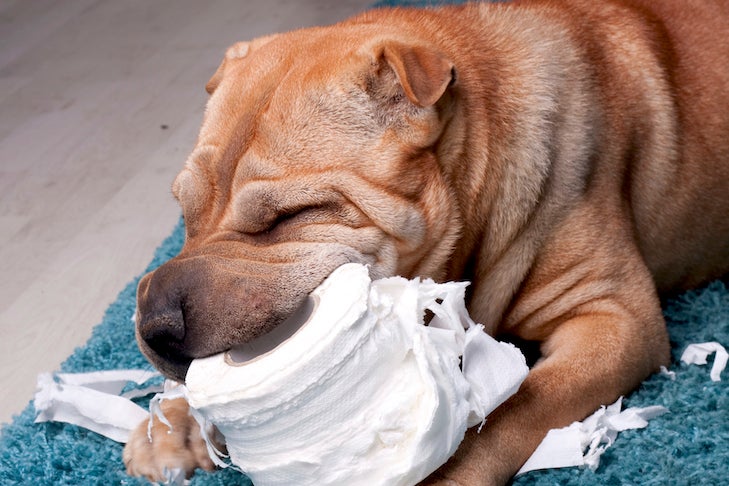
Dogs put all kinds of weird things in their mouths: discarded pizza on the sidewalk, grass during a long walk, or most disgustingly, their poop. But the oddest choice may be more common than you think.
Dogs ingest toilet paper for a variety of reasons. Unfortunately, eating toilet paper can result in serious health complications and large medical bills. Preventing or ending this behavior will help your canine companion live a healthier, happier, and longer life.
Why Do Dogs Eat Toilet Paper?
Whether they are chomping it or scattering it across the bathroom floor like snow, dogs eat toilet paper for a variety of behavioral or medical reasons.

Puppies indulge their curiosity as they investigate their environment with their mouths. Biting, chewing, and eating toilet paper can be a sign of a puppy in search of relief from teething pain. Adult dogs may also be attracted to toilet paper out of curiosity, as tasting different textures helps them understand their world.
Dogs may crave paper because they are missing crucial minerals, like iron, in their diet. Dogs lacking proper nutrition or enough caloric content for their size often try to ingest other substances to satisfy their appetites.
Other medical conditions could be to blame as well, as dogs dealing with gastrointestinal problems, diabetes, or worms turn to toilet paper out of hunger. Dogs may eat toilet paper because of a medical condition called “pica,” an eating disorder that makes dogs (and even humans) crave non-edible substances, often due to anemia or zinc deficiency.
Anxiety can also lead dogs to chew or shred paper in an effort to soothe themselves.
Dogs may also eat toilet paper simply because they are bored. If a dog isn’t receiving the attention that they crave, they may eat toilet paper to be noticed. To a dog, even negative reactions count as attention. Some dogs will eat toilet paper simply because they think that it’s fun.

How to Prevent your Dog from Eating Toilet Paper
1. Clean up their environment
The first step to eliminating this dangerous habit is by ensuring toilet paper is not easily accessible for your dog. Hide all extra toilet paper rolls and tissues behind baby-locked cabinets or keep them out of reach. Keep the bathroom door closed at all times.
Since dogs are often attracted to toilet paper rolls because they spin around, it may be helpful to invest in a special toilet paper dispenser that prevents dogs from accessing toilet paper.
If you aren’t able to supervise your dog at home, you need to either set up gates to cut access to the bathroom or crate your dog.
If your canine companion is munching toilet paper straight out of the trash can, keep cans securely sealed and out of reach. If your pup is an avid dumpster diver, try keeping the trash can behind a closed door.
2. Provide ample opportunities for mental and physical stimulation
“If they’re bored, they’re going to be looking for something to do,” said Mary Ann Zeigenfuse, owner of Best Friends Obedience. “A tired dog has happy owners because they’re less likely or less inclined to get into trouble.”
Routine exercise and ample playtime provide dogs with outlets for all their extra energy. Try increasing your pooch’s exercise by taking them on longer walks or playing tug-of-war together.
Since dogs require both physical and mental stimulation, Zeigenfuse recommends getting canines involved in AKC dog sports like Agility, Retrieving, and Scent Work so highly energetic dogs can use their hunting instincts and obedience skills.
3. Teach Dogs Basic Obedience Skills
To stop this behavior, you must teach your dog basic obedience commands like “leave it” and “give.” Basic obedience training is key to teaching dogs that while an object is accessible, it is not for them.
“It’s all about the dog listening to your words and listening to you,” said Zeigenfuse.
Once they’ve completed obedience training, reinforce it at home. If you catch your pup with toilet paper in their mouth, put your hand under their mouth and say “give.” If your dog goes for the toilet paper, say “leave it,” and give them a toy instead.
When a dog attracts your attention because they have toilet paper, dogs see toilet paper as a prize, making it a high-value toy. Likewise, if they pick up a toy and don’t receive attention, that object becomes less valued. Giving dogs an alternative toy, positively redirects their attention, and therefore their behavior.
How Eating Toilet Paper Harms Your Dog’s Health
Eating toilet paper can lead to serious digestive issues. At the very least, your pup may experience an upset stomach as the toilet paper passes through their system. This could cause vomiting, diarrhea, constipation, and lethargy.
It can even lead to a trip to the emergency room, as toilet paper can cause blockages in dog’s intestines that require surgery. Signs of a blocked intestine include weight loss, bloating, pain, or an inability to eat.
What to Do if your Dog Eats Toilet Paper
If your dog is eating toilet paper, make an appointment with your veterinarian immediately. Since this can point to underlying health conditions, it’s important for your dog to undergo a physical examination. Your veterinarian will be able to perform any test needed to come to a diagnosis. If the root cause is a health problem, your veterinarian can recommend special medication, diets, or advice.
If the cause isn’t due to a medical condition, it’s a behavioral problem. Your veterinarian can recommend behavioral solutions to help. You may need to consult a dog trainer for obedience training or your local AKC club to get started in dog sports and training classes.
Need some help training your dog? While you may not be able to attend in-person training classes during COVID-19, we are here to help you virtually through AKC GoodDog! Helpline. This live telephone service connects you with a professional trainer who will offer unlimited, individualized advice on everything from behavioral issues to CGC prep to getting started in dog sports.


